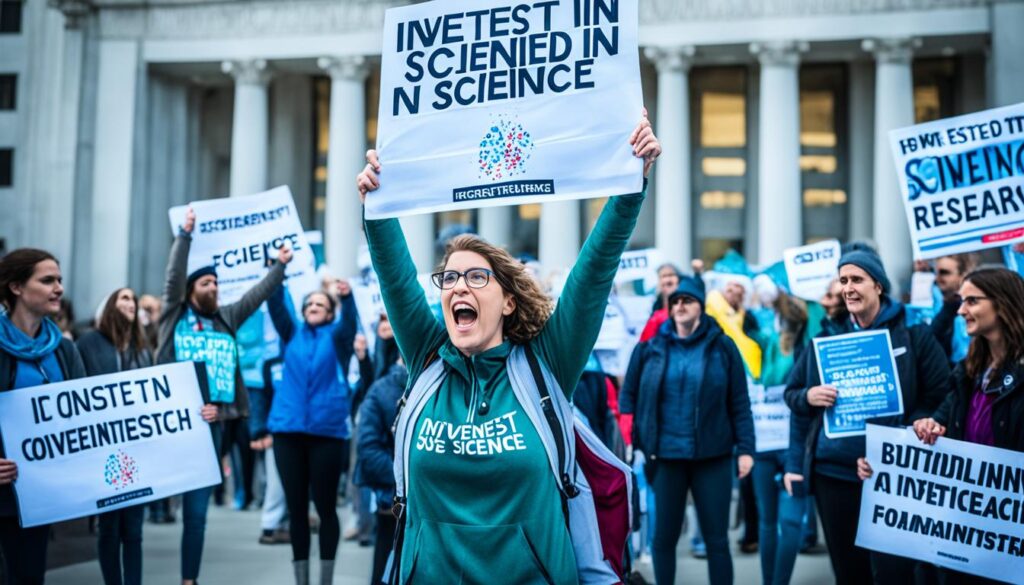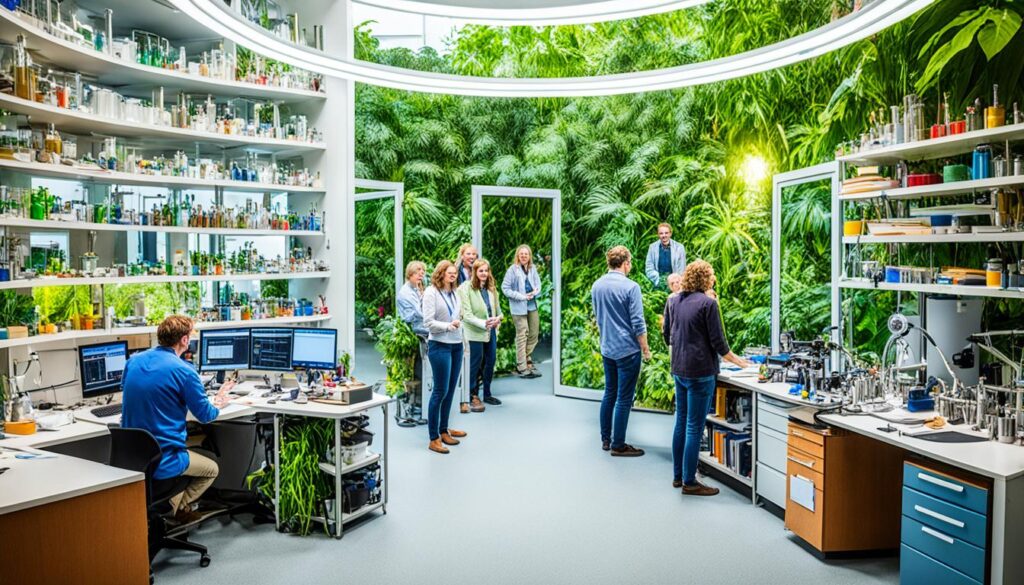In today’s fast-paced world, scientific research is more important than ever. It helps us make new discoveries and find solutions to big problems. By supporting this work, we can help shape our future.
This guide will show you how to help scientific research. It’s for anyone who wants to make a difference in science. You’ll learn how to contribute, whether you’re an individual or a group.
The Importance of Scientific Advancements
Scientific advancements have led to huge changes in our world. They’ve helped us understand the universe better and find new ways to solve big problems. Science has a big impact on our lives.
Groundbreaking Discoveries and Innovations
Science has changed how we live, work, and see the world. Breakthroughs in medicine, tech, and renewable energy have made life better. They’ve also opened new doors for what we can achieve.
These discoveries and innovations can save lives and shape the future. They help us live better and improve the world for everyone.
Solving Global Challenges
Our world faces big challenges like climate change, not having enough resources, and new diseases. Science and innovation are key to solving these problems. Researchers are working hard to find new ways to deal with these issues.
They’re looking into renewable energy and better farming methods. By using science, we can overcome these challenges and make a better future for everyone.
Donate to Research Institutions and Organizations
Supporting scientific research is crucial today. By giving to trusted research groups, you help drive new discoveries. Your money can change the world, whether you’re an individual or a business.
It’s key to pick reliable and open organizations. Look for ones with a strong history, clear goals, and effective use of funds. Top choices include leading universities, non-profits, and scientific groups when donating to scientific research.
Your gift can help in many areas, like finding new treatments or improving technology. By funding scientific organizations, you’re investing in a better future. Look for a cause that matches your values and interests.
Donating to support research institutions can be a one-time or ongoing act of kindness. Connect with these groups to see where your money goes. This way, you can make a big difference.
Volunteer for Scientific Studies and Trials
Joining scientific studies and clinical trials is a great way to help medical progress. By volunteering, you can directly help create new treatments and cures. Your choice to help can lead to big discoveries that change many lives.
Contributing to Medical Advancements
Your help as a volunteer is very important. You give your time and effort to help researchers. This helps them find new ways to fight diseases and improve health care.
Your role can speed up the creation of new solutions. By joining these studies, you make a real difference in health care.
Your work goes beyond the study itself. The results can lead to big changes in health care. You could help create new treatments or tools that change lives. Your effort can leave a lasting impact on health and well-being.
Advocate for Increased Government Funding
Getting enough government money is key for scientific progress. You can help by pushing for more funds for science. Talk to policymakers and officials to make sure science gets the support it needs.
Lobbying for Science Budgets
Lobbying is a strong way to push for more science funding. Talk to your local, state, and federal reps about the need for research money. Share new scientific discoveries and how they could change society. Explain why government money is crucial for science to grow.
Tell your reps to put science funding first in their plans and budgets. Working with science groups and others who care about science can make your voice louder. Together, you can convince lawmakers to give more money to science. This helps science move forward and solve big problems.

Your efforts to support science funding can really help. By using your influence and speaking up for science, you can help keep scientific progress going. This can make our world better.
Engage with Science Education and Outreach
Promoting science education and outreach is key to inspiring future scientists. It helps create a society that values science. By getting involved, you can help spread scientific knowledge and understanding.
Science education programs need volunteers for hands-on activities and workshops. Helping out can spark curiosity in young minds. It also lets you share your love for science. You could volunteer at a museum, science center, or school, making a big difference in the next generation of scientists.
Science outreach goes beyond the classroom. It brings science to the community through festivals, lectures, and events. By joining in, you help make science more accessible and spark conversations about its importance. This deepens the public’s understanding of science and its impact on our lives.
Getting involved in science education and outreach does more than help the community. It also broadens your knowledge and appreciation for science. By sharing what you know, you encourage others to dive into the world of science. This helps build a society that values scientific knowledge.
Participate in Citizen Science Projects
In today’s digital world, science has changed to use crowdsourcing. Citizen science lets people help with research, making big discoveries and progress. By joining, you can help grow our knowledge and tackle big challenges.
Crowdsourcing Scientific Data
You can help collect and analyze scientific data through citizen science. This helps researchers who don’t have enough time or resources. Projects like tracking animals or monitoring the environment use volunteers’ efforts to get important info. This info helps make big decisions and policies.
By taking part, you open new doors for science and can really make a difference in the world.
Citizen science projects are in many fields, like astronomy, biology, climate change, and health. If you love birds, nature, or just like to learn, there’s a project for you. Joining these efforts lets you learn and help shape future science research.
Support Open Access to Scientific Research
In today’s digital age, open access to scientific research is more important than ever. By sharing research with everyone, we speed up scientific progress and make knowledge available to all. This helps us all learn and innovate together.
Open access lets researchers, students, and the public get to the latest science without paying. This openness helps people work together, find new discoveries, and bring about big changes that help everyone. By supporting open access, you help make science more open and fair for everyone.

If you’re a researcher, policymaker, or just someone who cares, there are many ways to support open access. You can push for policies that make research open, give to groups that support open science, or even join in on citizen science projects. By doing this, you can help unlock the power of science and work towards a better future.
Science: Fueling Technological Progress
Science and technology work together like two sides of the same coin. Scientific discoveries push technology forward, changing industries and making our lives better. This back-and-forth between science and tech has led to fast progress in recent years.
Technological leaps, like the Internet and renewable energy, came from scientific discoveries. Science’s impact on tech is clear, as new findings open up new possibilities. This partnership between science and tech can change the world, leading to a better, more advanced future.
As we explore more in science, we’ll see even more tech advancements. These will improve our lives in big ways, like saving lives and cutting down on pollution. The link between science and technology means a future full of change and progress.
Encourage STEM Education and Careers
It’s vital to inspire the next generation of scientists and innovators for the future. By pushing STEM (Science, Technology, Engineering, and Mathematics) education and careers, we can grow the love for discovery and solving problems in young people. We can do this through mentorship, hands-on workshops, and outreach programs.
Inspiring Future Scientists
Role models and mentors are key in guiding young people’s dreams. By linking students with successful STEM experts, we give them valuable advice, insights, and motivation. These mentorships help students see themselves in STEM careers, boosting their confidence and drive to reach their dreams.
Also, showing students how STEM fields apply in real life makes them more interesting. We can do this with interactive workshops, science fairs, and lab visits. These activities highlight the cool and important work in STEM fields. They can ignite a lasting love for STEM subjects and push more students towards these careers.
Stay Informed About Scientific Breakthroughs
It’s important to keep up with the latest in science to truly appreciate its value. Whether you love science or just find it interesting, there are many ways to learn about new discoveries. You can follow scientific news and research easily.
Subscribing to trusted science news sources is a great way to stay updated. Look for popular science magazines, blogs, and podcasts. They cover the newest findings and advancements in fields like medicine, technology, and astronomy.
Following scientists and research groups on social media is another good tip. They often post about the latest news and insights. This makes it easy to keep up with scientific breakthroughs.
By keeping an eye on scientific progress, you’ll see how fast things change. This can make you appreciate science more and encourage you to support it. You might donate, volunteer, or speak out for scientific research.
Promote Scientific Literacy and Critical Thinking
In our fast-changing world, understanding science and thinking critically is key. By making science more accessible, we help people make better choices. They can join meaningful talks and help science grow.
Access to clear, easy-to-understand science content is vital. Through different platforms, people can learn about new discoveries and how research works. This encourages a culture of curiosity and questioning, pushing us to seek answers and solutions.
Science education and communication are also crucial. By supporting STEM programs, we inspire future scientists and innovators. Teaching critical thinking skills lets people handle scientific information with confidence and wisdom.
By focusing on scientific literacy and critical thinking, we build a society that’s well-informed and active. People can make smart choices, drive scientific advancements, and tackle global issues with evidence-based thinking.
Ethical Considerations in Scientific Research
As science moves forward, we must think about its ethical sides. It’s key to follow strict ethical rules to protect people in studies, be open, and use discoveries wisely.
Science has many ethical issues, like getting consent, keeping data private, stopping harm, and sharing benefits fairly. Researchers need to be careful, making sure their work is honest and respects all living beings.
Creating a culture of ethical science helps us use research to the fullest. It lets us tackle big problems, make life better, and move forward in a sustainable way. This part talks about why ethical considerations in science matter, the importance of responsible scientific research, and the ethical guidelines for research. These rules help scientists work towards knowledge and new ideas.



